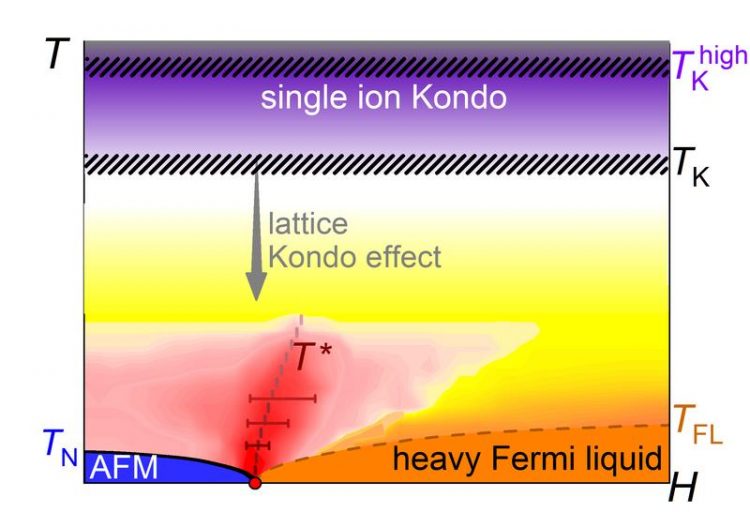Heavy-electron quantum criticality and single-particle spectroscopy

Phase diagram of a local quantum critical metal. Grafik: Steffen Wirth, MPI CPfS
Quantum criticality itself, however, turned out to come in different manifestations. Specifically in transition metal compounds, quantum criticality can usually be discussed within a scheme of itinerant, i.e. spin-density wave, order.
Yet, other materials defy such a description, as unequivocally shown by inelastic neutron scattering experiments on CeCu5.9Au0.1.
Here, a novel picture was called for, going substantially beyond the Landau framework based solely on order-parameter fluctuations.
The present article published in Rev. Mod. Phys. reviews the recent progress made in this perplexingly complex research field with seemingly conflicting input.
Intimately tied to any theoretical progress is the quest for new experimental insight. Photoemission is a direct means of determining the band structure of solids. It thus has the potential to give momentum-resolved information on the one-electron Green function.
The main issues in applying this technique to the f-electron systems has not only been in reaching the required low temperature but also in obtaining sufficient energy resolution.
On the other hand, Scanning Tunneling Spectroscopy provides access to the one-electron Green function with sufficient resolution but due to quantum interference effects the interpretation of the measurements can be complicated. Results obtained by both experimental techniques on the two archetypical (classes of) compounds, YbRh2Si2 and CeMIn5, are critically evaluated.
It is this tight interplay between recent theoretical and experimental advances, with emphasis on the one-electron Green function of Kondo systems, on which this review focuses while providing a broader base for ongoing discussions and open issues. As such, this Colloquium article is most timely, and certainly presents a profound and valuable overview of the current aspects and literature in quantum criticality of condensed matter.
The research at the Max Planck Institute for Chemical Physics of Solids (MPI CPfS) in Dresden aims to discover and understand new materials with unusual properties.
In close cooperation, chemists and physicists (including chemists working on synthesis, experimentalists and theoreticians) use the most modern tools and methods to examine how the chemical composition and arrangement of atoms, as well as external forces, affect the magnetic, electronic and chemical properties of the compounds.
New quantum materials, physical phenomena and materials for energy conversion are the result of this interdisciplinary collaboration.
The MPI CPfS (www.cpfs.mpg.de) is part of the Max Planck Society and was founded in 1995 in Dresden. It consists of around 280 employees, of which about 180 are scientists, including 70 doctoral students.
Steffen Wirth, MPI CPfS Dresden
Steffen.Wirth@cpfs.mpg.de
https://journals.aps.org/rmp/abstract/10.1103/RevModPhys.92.011002
Rev. Mod. Phys. 92, 011002 (2020)
DOI: 10.1103/RevModPhys.92.011002
Media Contact
More Information:
https://www.cpfs.mpg.deAll latest news from the category: Physics and Astronomy
This area deals with the fundamental laws and building blocks of nature and how they interact, the properties and the behavior of matter, and research into space and time and their structures.
innovations-report provides in-depth reports and articles on subjects such as astrophysics, laser technologies, nuclear, quantum, particle and solid-state physics, nanotechnologies, planetary research and findings (Mars, Venus) and developments related to the Hubble Telescope.
Newest articles

Machine learning algorithm reveals long-theorized glass phase in crystal
Scientists have found evidence of an elusive, glassy phase of matter that emerges when a crystal’s perfect internal pattern is disrupted. X-ray technology and machine learning converge to shed light…

Mapping plant functional diversity from space
HKU ecologists revolutionize ecosystem monitoring with novel field-satellite integration. An international team of researchers, led by Professor Jin WU from the School of Biological Sciences at The University of Hong…

Inverters with constant full load capability
…enable an increase in the performance of electric drives. Overheating components significantly limit the performance of drivetrains in electric vehicles. Inverters in particular are subject to a high thermal load,…





















